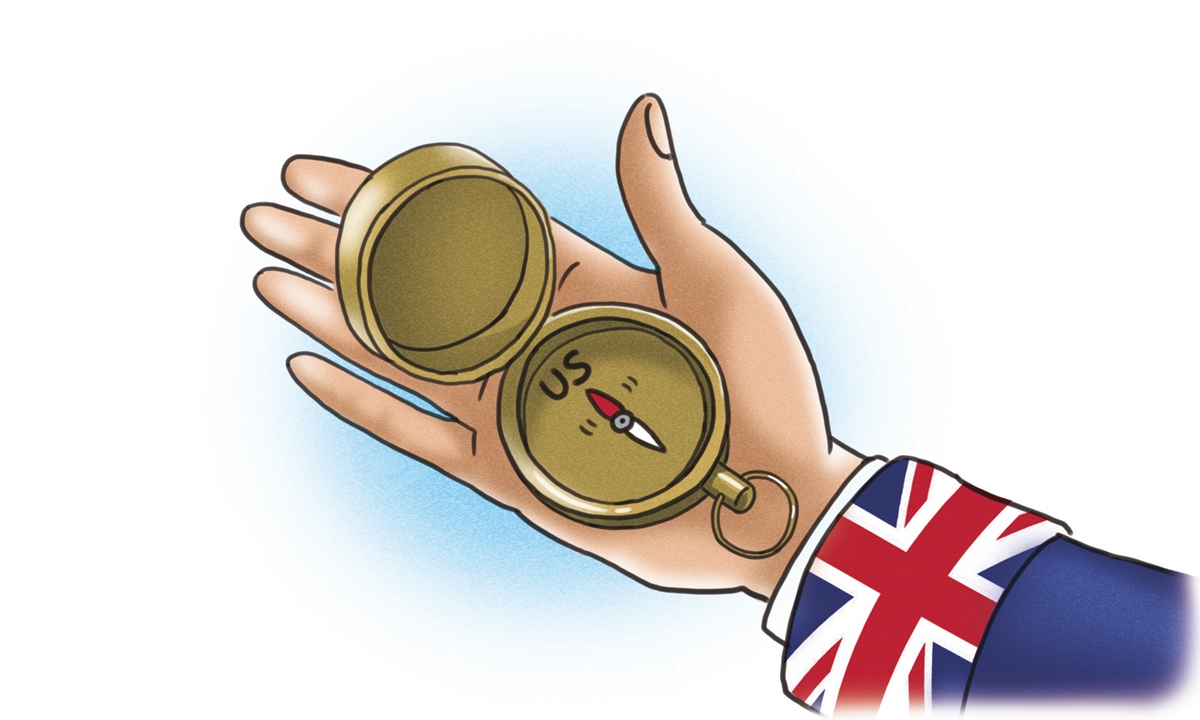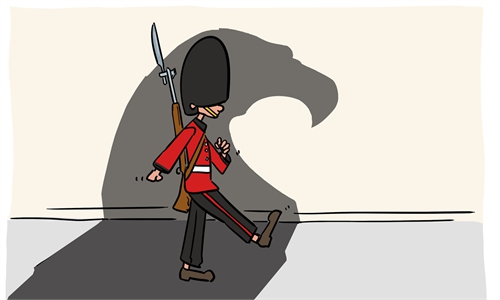
Illustration: Liu Rui/GT
The UK has become a center of a new cold war with anti-China government activity. It has banned the TV broadcasting of China's English language CGTN network. It has overturned its previous decision to allow Huawei to participate in the development of the UK's 5G network. It has announced its intention to send an aircraft carrier to the South China Sea. This is in such sharp contrast to the "golden period" of China-British relations, under former British prime minister David Cameron. This poses at least two questions. Why did this change occur? What general lessons can be drawn from it?The fundamental reason for the change in British government policy toward China is directly connected to Brexit. Despite Brexit being explained to the British people as being about "national independence," its real content is quite different. Eighty years ago, Britain's Empire made it a Great Power. Today, its economy is too small to pursue a truly independent path when confronted with two huge economic powers: the EU and the US. It inevitably allies itself with one or the other.
But the EU and the US have recently been travelling very different paths in relation to China. The US, under Trump, tried to launch a new cold war against China - a trade war, attempts to block Huawei and other Chinese technology firms from Western markets, new cold war falsifications against China on Hong Kong, Xinjiang etc. The EU, in contrast, in January signed an EU-China Comprehensive Agreement on Investment despite US opposition. In 2020 China overtook the US as the EU's largest trading partner; with EU trade with China reaching $711 billion compared to $673 billion for the US.
Cameron logically pursued the "golden period" of UK-China relations as part of his support for British EU membership. He attempted to place the UK as China's best doorway into the EU. This policy had many chances for success. London, with New York, is one of the world's most important international financial centers. It is the world's largest foreign exchange trading center, English is the first foreign language learnt by Chinese citizens - making it easier for Chinese companies to set up overseas headquarters in the UK than in most other EU states. Therefore, there were real opportunities for a genuinely win-win relationship between the UK and China.
Brexit sharply changed this situation. The UK could no longer be an entry point for Chinese firms into the EU. Meanwhile the solely British market was too small to be of fundamental interest to Chinese companies compared to the EU.
Instead of orienting itself toward the EU the British government led by Boris Johnson oriented itself to the US - setting as its most fundamental goal arriving at a free trade agreement with the US. But such an orientation to the US necessarily meant a subordination to US foreign policy; which under Trump was strongly anti-China.
This anti-China policy of the Johnson government was directly against the economic interests of the British people. The ban on Huawei means 5G will be delivered later and more expensively in the UK. The creation of bad relations with China means that the jobs will be lost that Cameron had aimed to create in the financial service sector to deal with business from China. But once the Johnson government had decided that everything must be subordinated to relations with the US, then this economic damage to the UK had to be accepted.
Other non-directly economic measures were a direct result of this action against the interest of the British people. The ban on CGTN happened because it was essential to conceal the reality of the situation, and of China, from the British people - CGTN's license in the UK was not revoked "fake news" but because it broadcast "true news!"
Many British companies may want to do business with China, as China is the world's most rapidly growing economy - which directly goes against an attempt to whip up an anti-China atmosphere. At the time of writing, the UK has one the highest number of deaths from COVID-19 of any major industrial country. Therefore, even the factual comparison of Britain's failure in dealing with COVID-19 to China's was unacceptable to the British government.
It is certainly important not to exaggerate. CGTN's presence in the UK was of course much smaller than the powerful British media organizations such as the BBC. But given how much the Johnson government's anti-China policies were against the interests of the British people it was considered necessary to shut down an information source explaining the real situation.
How will this situation develop and what are the lessons to be drawn from it? The first depends on the policies of the Biden administration. The British government, via Brexit, decided to subordinate itself even more to the US. Under Trump this meant an increasingly anti-China policy. This will continue if Biden pursues an anti-China policy. If the Biden administration returns to more rational policies toward China, then Britain's approach to China may also be expected to become more reasonable.
Second, this indicates a growing international trend. US anti-China policies are not only against the interests of the US and China, but they also damage the peoples of other countries that pursue them: by raising prices of telecommunications through exclusion of Huawei, by tariffs etc. Most countries in the world, particularly the "Global South," that is developing countries, but also to a large extent the EU, refuse to along with this. This is reflected at the UN where the majority of countries vote with China against US resolutions on issues such as Hong Kong and Xinjiang. But a small number of countries - the closest US allies such as first Australia and now the UK - have gone along with US anti-China cold war policies.
In other words, the key to why the British government has gone along the "Australian" path of hostility to China, instead of the EU one of economic cooperation with China, and what will be its future actions, does not lie in London, but in Washington.
The author is senior fellow at Chongyang Institute for Financial Studies at Renmin University of China, he was formerly director of Economic and Business Policy for the Mayor of London. opinion@globaltimes.com.cn

